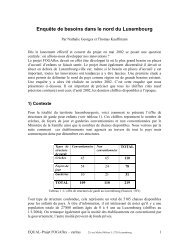Die Entwicklung integrierter familienunterstützender - Qualiflex.lu
Die Entwicklung integrierter familienunterstützender - Qualiflex.lu
Die Entwicklung integrierter familienunterstützender - Qualiflex.lu
Create successful ePaper yourself
Turn your PDF publications into a flip-book with our unique Google optimized e-Paper software.
France - 3. Recent measures, new schemes<br />
the advantage in that it simplifies bureaucratic procedures and reduces the<br />
employers’ costs. They purchase the cheques from their local bank.<br />
In exchange, households and families can benefit form generous tax deductions:<br />
they may deduct 50 per cent of the real costs from their income<br />
tax, up to a limit of 6,000 Euros per year.<br />
As a result there has been over the last decade a dramatic increase in the<br />
number of jobs in the service sector and in the number of households relying<br />
on this CESU. 9<br />
Research (Windebank, 2007) has demonstrated that in terms of the<br />
amount of relief gained by the women who purchase paid domestic services<br />
the impact is marginal and “such schemes are shown to exacerbate the problem<br />
of the unequal gender division of domestic labour. This is because they<br />
reinforce the gender stereotyping surrounding domestic work by transferring<br />
it from more well-off to less well-off women. Consequently, the question<br />
of the redistribution of domestic tasks between men and women is sidestepped”.<br />
3.6 The establishment of the “family tax credit”<br />
(Crédit d’impôt famille, CIF) for enterprises<br />
Employers partly fund through their social contributions (5% of the wages)<br />
family allowances and creation and running of public childcare facilities. But<br />
over the last decade they have also been encouraged by successive governments<br />
to develop family-friendly initiatives. In exchange they have been<br />
provided with financial incentives.<br />
One recent measure il<strong>lu</strong>strates this new trend: Established since 2004<br />
(Borloo Law), the Family tax credit (Crédit d’impôt famille, CIF) is a financial<br />
incentive provided to companies to encourage them to develop familyfriendly<br />
initiatives for their employees (inc<strong>lu</strong>ding the pre-paid CESU). The<br />
CIF stipulates that 25 per cent of related expenses are deductible from taxes<br />
paid by the company up to a ceiling of 500,000 Euros per year and per<br />
company (Finance Law of 2004, art. 98). Within this regulatory framework,<br />
4 categories of expenses are eligible:<br />
� expenses linked to training programmes for employees on parental leave<br />
� supplements paid to employees on maternity or paternity leave or on<br />
child-sick leave<br />
� creation of their own crèches or contribution to the running of crèches with<br />
places reserved for the employees’ children under three years of age.<br />
� getting employees a refund on expenses related to exceptional childcare<br />
costs pertaining to unpredictable professional obligation outside the normal<br />
work schedules.<br />
� pre-paid CESU<br />
9 See http://195.154.196.81/siteXerfi/spot/pdf/6SME14.pdf and Windebank, 2007.<br />
45



